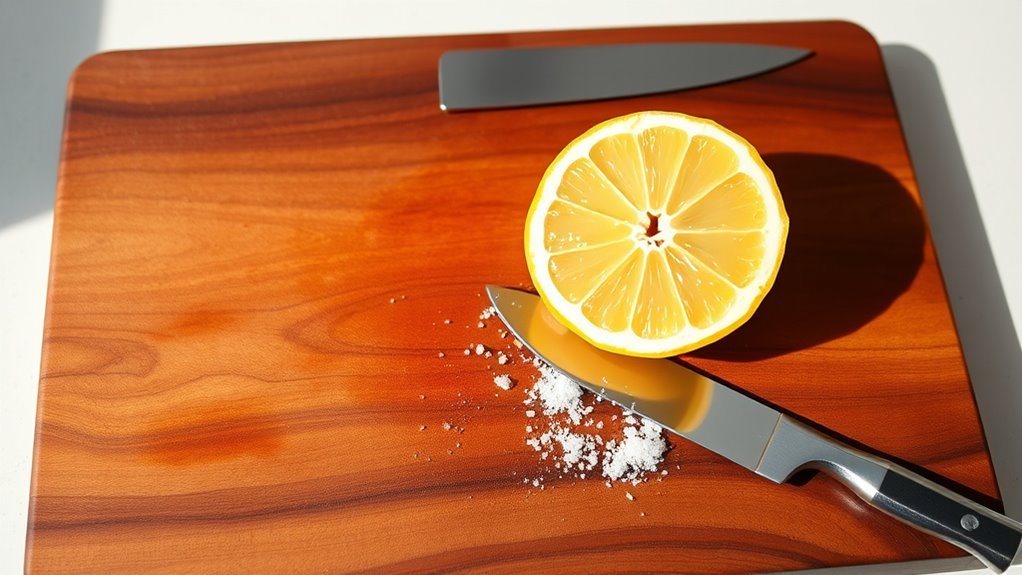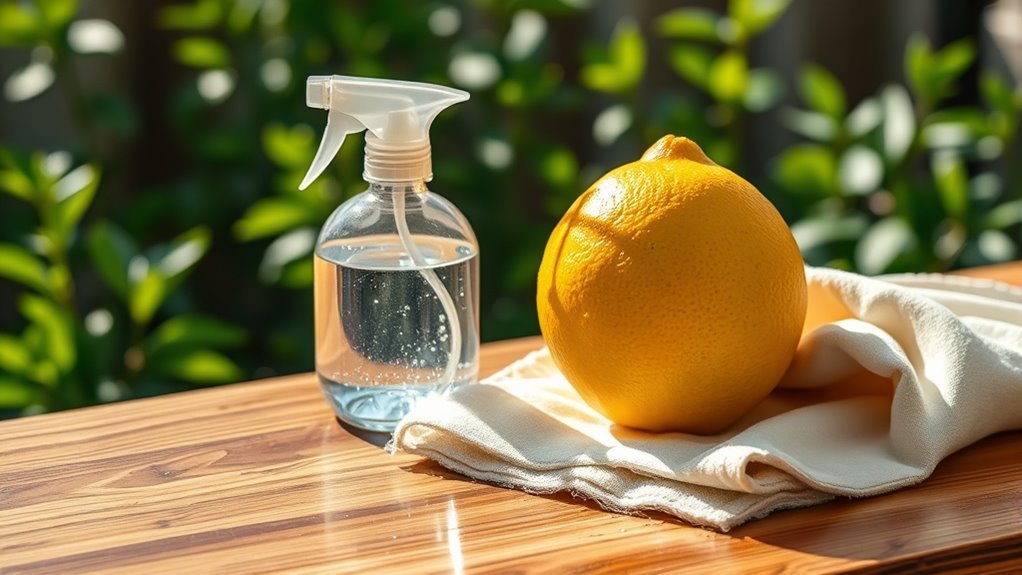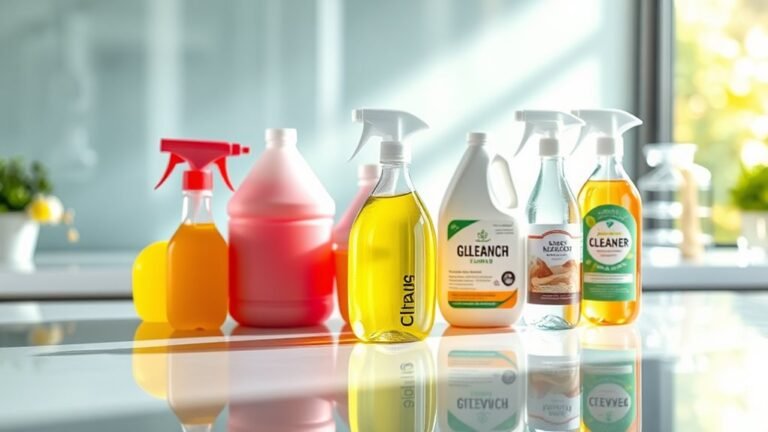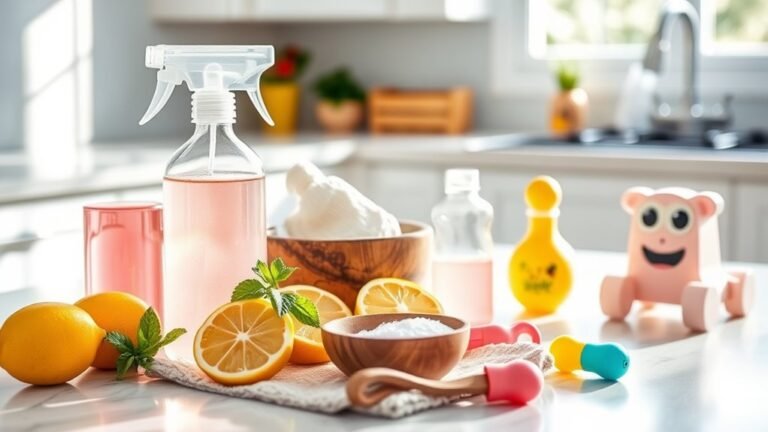Cleaning With Lemon: 10 Surprising Uses
You can use lemon in many surprising ways to clean your home naturally. It brightens laundry, removes stains from cutting boards and fabric, and freshens wooden furniture. Lemon also polishes metals like copper and brass, eliminates odors in garbage disposals, and restores shine to stainless steel appliances. Plus, it helps disinfect kitchen surfaces and even cleans microwave interiors. Stick around to discover more clever lemon cleaning tricks that make your chores easier and eco-friendly.
Removing Stains From Cutting Boards

If you’ve noticed stubborn stains on your cutting boards, lemon can be a simple and effective solution. Grab a fresh lemon and cut it in half. Squeeze some lemon juice directly onto the stained areas of your cutting board, then use the lemon half to scrub the surface thoroughly. The natural acidity in lemon juice helps break down tough stains and lifts away residue without harsh chemicals. Let the lemon juice sit for a few minutes to work its magic, then rinse the cutting board with warm water and dry it. This method not only cleans but also refreshes your cutting board, giving you freedom from lingering stains and odors. Using lemon juice keeps your kitchen tools fresh, natural, and ready for your next culinary adventure.
Brightening and Deodorizing Laundry
You can brighten your laundry naturally by adding lemon juice to your wash cycle, which helps restore fabric whiteness without harsh chemicals. Lemon’s natural acidity also works to eliminate odors, leaving your clothes smelling fresh. Let’s explore how this simple ingredient boosts both brightness and scent in your laundry routine.
Natural Fabric Brightener
Although commercial fabric brighteners can be effective, using lemon offers a natural way to brighten and deodorize your laundry without harsh chemicals. Lemon’s natural bleaching properties gently lift stains and restore the brightness of your fabrics, all while caring for the fibers. This means your clothes stay vibrant longer without exposure to synthetic dyes or additives.
Here’s a quick guide to harness lemon’s power for fabric care:
| Step | Tip |
|---|---|
| Add lemon juice | Use ½ cup in your wash cycle |
| Pre-treat stains | Rub lemon directly on spots before washing |
| Avoid direct sun drying | Prevent fabric damage by drying in shade |
| Combine with baking soda | Boost brightening and deodorizing effects |
You’re free to enjoy clean, fresh, naturally brightened laundry every time!
Fresh Scent Boost
How can you effortlessly elevate the freshness of your laundry while keeping it naturally bright? Add a few drops of lemon essential oil to your washing routine. Its powerful citrus aroma doesn’t just mask odors—it actively neutralizes them, leaving your clothes smelling clean and vibrant. Unlike artificial fragrances, lemon essential oil delivers a pure, uplifting scent that revives your laundry without harsh chemicals. Simply mix it into your detergent or dilute in water for a revitalizing rinse. This natural boost brightens fabrics and keeps them smelling fresh longer, freeing you from relying on synthetic sprays or heavy perfumes. Embrace the freedom of fresh, naturally scented laundry with lemon’s invigorating touch—your clothes will thank you, and so will your senses.
Cleaning and Polishing Copper and Brass

Three simple ingredients—lemon, salt, and a little elbow grease—can restore the shine to your copper and brass items quickly. If you want to break free from dull, tarnished metals, here’s how you can tackle copper patina removal and brass tarnish prevention with ease:
- Cut a lemon in half and sprinkle salt on the exposed flesh.
- Rub the lemon over your copper or brass surfaces, applying gentle pressure to lift oxidation without scratching.
- Rinse with warm water and dry thoroughly to prevent water spots and future tarnishing.
Using this natural method, you control what touches your belongings, giving you freedom from harsh chemicals and keeping your metals gleaming bright. It’s simple, effective, and liberates your cleaning routine.
Eliminating Odors From Garbage Disposals
If you’ve noticed unpleasant smells coming from your garbage disposal, lemon can be a quick fix to freshen things up. Simply toss a few lemon peels into the disposal, then run cold water while turning it on. The natural oils in the peels break down grime and neutralize odors, leaving a crisp, clean scent. This easy step not only eliminates bad smells but also aids in disposal maintenance by reducing buildup. For lasting freshness, make it a habit to grind lemon peels weekly. You’ll enjoy a garbage disposal that smells great and runs smoothly, giving you the freedom to avoid harsh chemicals and tedious scrubbing. Lemon peels offer a natural, effective way to keep your kitchen fresh and your disposal in top shape.
Removing Hard Water Deposits From Faucets

Tackle hard water deposits on your faucets by using lemon’s natural acidity to dissolve stubborn buildup. This simple step frees you from harsh chemicals and keeps your faucet looking fresh. Here’s how to make lemon work for your faucet maintenance:
- Cut a lemon in half and rub it directly onto the affected areas, letting the juice sit for 5-10 minutes.
- For tough deposits, soak a cloth in lemon juice, wrap it around the faucet, and leave it for 30 minutes.
- Rinse thoroughly with warm water and wipe dry to prevent new hard water spots.
Using lemon gives you an easy, eco-friendly way to maintain your faucets, keeping your space clean and your routine free from hassle.
Disinfecting and Freshening Kitchen Surfaces
Lemon’s natural acidity isn’t just great for removing hard water deposits on faucets—it’s also a powerful tool for disinfecting and freshening your kitchen surfaces. When you use lemon juice, you embrace an eco-friendly way to boost kitchen hygiene without harsh chemicals. Its antibacterial properties help eliminate germs, while its fresh scent leaves your space inviting.
Here’s a quick guide to lemon benefits for common kitchen surfaces:
| Surface | Lemon Use | Benefit |
|---|---|---|
| Countertops | Rub with lemon slice | Disinfects, deodorizes |
| Cutting Boards | Scrub with lemon + salt | Removes stains & odors |
| Sink | Pour lemon juice + scrub | Kills bacteria |
| Stove Tops | Wipe with lemon-soaked cloth | Cuts grease, freshens |
| Refrigerator | Wipe shelves with lemon water | Eliminates odors |
Trust lemon to keep your kitchen clean and fresh effortlessly.
Cleaning Microwave Interiors Naturally
When you want an easy and natural way to clean your microwave’s interior, lemon juice is a fantastic choice. The microwave steam from lemon water loosens grime effortlessly, making cleanup quick and chemical-free. Here’s how you do it:
- Slice a lemon and place it in a microwave-safe bowl filled with water. Add a pinch of lemon zest for extra freshness.
- Microwave on high for 3-5 minutes, allowing the microwave steam to soften splatters inside.
- Carefully remove the bowl and wipe down the interior with a clean cloth.
This method frees you from harsh cleaners, leaving your microwave fresh and naturally sanitized. Give it a try and enjoy the freedom of a fresh, lemon-scented kitchen!
Restoring Shine to Stainless Steel Appliances
To bring back the sparkle on your stainless steel appliances, you’ll want to tackle those stubborn fingerprints first. Lemon’s natural acidity makes it perfect for cutting through smudges without harsh chemicals. Once clean, a quick polish will leave your appliances gleaming like new.
Removing Fingerprints Effectively
Wiping away fingerprints from stainless steel appliances can be tricky, but a simple lemon solution can help you cut through smudges and restore their natural shine. For effective fingerprint removal, try this easy lemon spray method that’s both natural and powerful.
- Mix fresh lemon juice with water in a spray bottle—this lemon spray is your go-to for tackling greasy fingerprints without harsh chemicals.
- Spray the solution lightly onto the fingerprinted area.
- Wipe gently with a clean microfiber cloth, moving in the direction of the grain to avoid streaks.
This quick, fresh approach gives you freedom from stubborn marks while keeping your appliances gleaming naturally. Lemon’s natural acidity breaks down oils, making fingerprint removal effortless and eco-friendly.
Polishing Tips and Tricks
After removing fingerprints with lemon juice, you’ll want to restore your stainless steel appliances’ natural shine. One of the best lemon benefits is its natural acidity, which gently cuts through grime without harsh chemicals. For polishing techniques, squeeze fresh lemon juice onto a soft cloth and gently buff the surface in the direction of the grain. This method not only brightens but also leaves a fresh scent, giving you freedom from synthetic cleaners. After polishing, wipe down with a damp cloth to remove any residue, then dry thoroughly to prevent streaks. Regular use of lemon in your polishing routine keeps your appliances gleaming and resilient, letting you enjoy a clean, vibrant kitchen with less effort and more peace of mind.
Removing Stains From Fabric and Upholstery
Although fabric and upholstery stains can be stubborn, lemon’s natural acidity makes it a powerful and gentle stain remover. When you want effective stain treatment without harsh chemicals, lemon gives you freedom to care for your fabrics naturally. Here’s how you can tackle stains with lemon:
- Apply lemon juice directly on the stain and let it sit for 5–10 minutes.
- Gently blot the area with a clean cloth to lift the stain without spreading it.
- Rinse with cold water and launder or clean as usual to protect your fabric care routine.
Using lemon empowers you to maintain fresh, clean fabrics while avoiding synthetic products. It’s a simple, eco-friendly way to keep your upholstery and clothes looking their best.
Freshening and Cleaning Wooden Furniture
You can use lemon to naturally remove stains from your wooden furniture without harsh chemicals. Its acidity helps break down grime, while the fresh scent leaves your wood smelling clean. Plus, lemon juice combined with oil makes a great polish to restore shine and protect surfaces.
Removing Stains Naturally
When wooden furniture shows stains or dullness, lemon can be a powerful natural cleaner to restore its shine. Its lemon juice acts as a gentle natural bleach, breaking down stubborn marks without harsh chemicals. Here’s how you can use it effectively:
- Squeeze fresh lemon juice onto a soft cloth and gently rub the stained area.
- Let the juice sit for 5-10 minutes to allow the natural bleach properties to work on discoloration.
- Wipe the furniture clean with a damp cloth and dry it immediately to prevent moisture damage.
Polishing Wood Surfaces
Since lemon’s natural oils not only clean but also nourish wood, you can use it to polish and freshen your wooden furniture effectively. This simple method enhances wood care by restoring a natural sheen without harsh chemicals. Just mix lemon juice with olive oil, apply lightly, and buff with a soft cloth. You’ll free your furniture from dullness, revealing its beauty.
| Step | Action |
|---|---|
| 1 | Mix equal parts lemon juice & oil |
| 2 | Apply with a soft cloth |
| 3 | Let it sit for 5 minutes |
| 4 | Buff until natural sheen appears |
Embrace this freedom-friendly ritual to keep your wood surfaces vibrant and healthy, all while enjoying a clean, fresh scent.
Frequently Asked Questions
Can Lemon Juice Be Used to Clean Glass Windows Effectively?
When it comes to cleaning glass windows, lemon juice can be your secret weapon to banish window streaks. You’re not stuck using harsh chemicals—lemon juice is a natural alternative that leaves windows sparkling without residue. Mix it with water for an easy, effective cleaning solution. You’ll feel like you’ve hit the jackpot, freeing yourself from streaky frustration and enjoying crystal-clear views with just a simple, fresh squeeze.
Is Lemon Safe for Cleaning Outdoor Patio Furniture?
You’ll find lemon is quite effective for cleaning outdoor furniture—it’s natural and cuts through grime without harsh chemicals. Its acidity helps break down dirt and stains while leaving a fresh scent. Just be careful using it on delicate materials, as lemon’s acidity might cause some fading or damage. Overall, lemon gives you a safe, eco-friendly way to keep your patio looking great, letting you enjoy freedom from toxic cleaners.
How Does Lemon Compare to Commercial Cleaners for Bathroom Tiles?
You might think lemon’s acidity is as fierce as a lion when tackling tile stains, and in some ways, it is! Lemon’s natural acids break down grime and mineral buildup on bathroom tiles without the harsh chemicals found in commercial cleaners. While it’s gentler and eco-friendly, it might take a bit longer or extra scrubbing compared to powerful store-bought products. If you want freedom from toxins and love natural solutions, lemon’s a smart, invigorating choice.
Can Lemon Help Prevent Mold Growth in Damp Areas?
You can definitely use lemon for mold prevention in damp environments since its natural acidity helps inhibit mold growth. While it’s not as powerful as some commercial chemicals, lemon is a great, eco-friendly option if you want to avoid harsh toxins and maintain a fresh scent. Just squeeze lemon juice on problem areas regularly to keep mold at bay and enjoy a cleaner, healthier space without feeling confined by strong chemicals.
What Are the Best Lemon-Based Recipes for Homemade All-Purpose Cleaner?
Imagine the crisp scent of lemon filling your home as you wipe away grime effortlessly. You’ll love these lemon uses: mix 1 cup water, 1 cup white vinegar, and 2 tablespoons lemon juice in a spray bottle for an eco friendly cleaner that tackles dirt and odors. Add lemon peels to baking soda for a fresh scrub. With these recipes, you’ll enjoy freedom from harsh chemicals while your space sparkles naturally.






